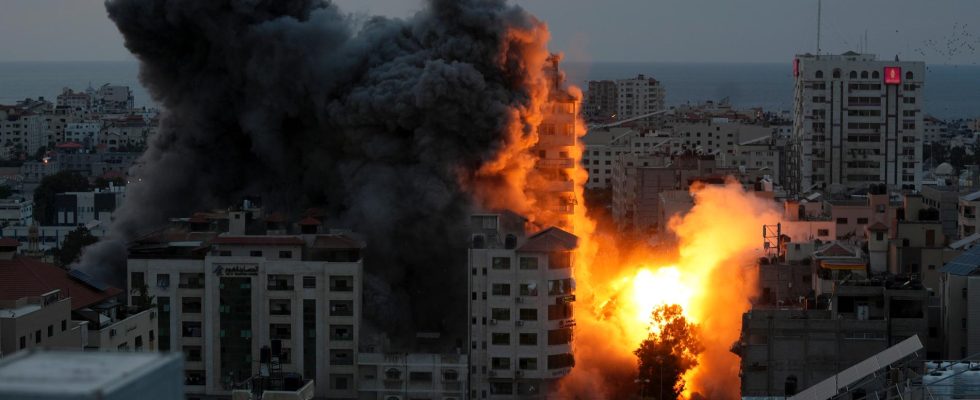Save the article
1 / 4 Photo: Adel Hana/AP/TT
Three weeks ago, the terrorist group Hamas went on a violent attack in several places in Israel. Since then, Israel has launched a full-scale invasion of Gaza.
WEEK ONE
At half past seven in the morning, Saturday 7 October, the terror-labeled group Hamas carries out a surprise attack on Israel. Thousands of rockets are fired into Israel from Gaza. Gunmen break through the border and attack civilians in nearby towns.
Soon militiamen from Hamas also enter kibbutzim and a music festival where they carry out what will be described as massacres.
At least 1,400 people, most of them civilians, are killed in the attacks and over 200 people are taken hostage.
Israel responds by launching a massive airstrike against Gaza. That the attack took Israel to bed is seen as a major failure for the Israeli intelligence service, which is considered to be among the best in the world.
In the evening, Prime Minister Benjamin Netanyahu announces that Israel will “act everywhere with all our might.”
Around the world, leaders condemn the terrorist attack on Israel. US President Joe Biden assures that the country’s support for Israel is “unwavering”. In several European capitals, the Israeli flag is raised.
On Sunday, Netanyahu declares that the country is formally at war. The Israeli military (IDF) states that the focus is on taking control of all of Gaza and “killing all terrorists”.
All imports of food, water, fuel and medicines into Gaza are stopped.
During the night of Tuesday, Israeli warplanes attack over 200 targets in Gaza, according to the IDF. Images show that many buildings, including a mosque, have been destroyed.
On Wednesday, the only power plant in Gaza runs out of fuel, which means that no electricity, which, among other things, the hospitals are completely dependent on, can be produced in the area.
At the same time, Israel’s military IDF calls on all civilians in Gaza City, where just over a million people live, to evacuate to the south “for their own safety”. The call is criticized by the UN, which warns of a humanitarian disaster.
Hundreds of thousands of Gazans are fleeing towards the southern parts of the enclave. But most remain in northern Gaza, without the possibility of moving.
WEEK TWO
Around the world, large demonstrations are held against Israel’s attacks on Gaza.
Israel’s military says it is ready for a full-scale ground offensive and tens of thousands of Israeli soldiers are being mobilized at the border with Gaza.
More and more international voices are demanding a humanitarian corridor to Gaza.
Joe Biden advises Israel against occupying Gaza.
On Tuesday morning, information comes from the Hamas-controlled health authorities about hundreds of dead in an Israeli air attack on a hospital.
Israel denies involvement and accuses the armed Palestinian group Islamic Jihad of accidentally causing the explosion. Several media, including the BBC and the AP news agency, assess after a detailed review of images and satellite photos that the most likely thing is that the attack did not come from the Israeli side.
UN Secretary-General António Guterres condemns “clear violations” in Gaza and calls for an immediate ceasefire. He also says it is important to remember that Hamas’s attacks did not take place “in a vacuum”, a statement he is strongly criticized for. Israel’s UN ambassador calls for his resignation.
On Thursday, about 20 cars with humanitarian aid will be given the green light to enter Gaza for the first time. “A drop in the ocean”, according to the UN.
On Friday, the first two people will be released from the hostages – a mother and a daughter with both Israeli and American citizenship. The release takes place after mediation by Qatar.
Israel’s military says it intends to further intensify attacks on the Gaza Strip starting on Saturday.
WEEK THREE
In addition to the large-scale airstrikes against the Gaza Strip, Israel also carries out attacks against Syria, Lebanon and the West Bank. Now the country is also threatening to attack Iran – if Hezbollah steps into the war.
On Sunday, another 14 trucks with support will be released into Gaza.
Hamas’s armed wing announces that two elderly women held hostage by Hamas have been released for “humanitarian reasons”.
Two days later, Hamas claims that around 50 of the hostages have been killed in Israeli attacks. It is a statement that has not been confirmed by independent sources.
According to Amnesty International, Israel has committed several war crimes in the bombing of Gaza. The EU joins the chorus demanding that humanitarian aid be allowed into the area.
On Friday evening, Israel’s military steps up further after the last few nights’ raids into Gaza and carries out extensive aerial bombing of the area.
The ground attacks lead to the internet and the mobile and telephone network being knocked out completely. The area’s 2.3 million inhabitants are now without the opportunity to make contact with the outside world.
According to the Gaza Ministry of Health, at least 7,700 people have been killed since the war began, most of them civilians and many of them children.
